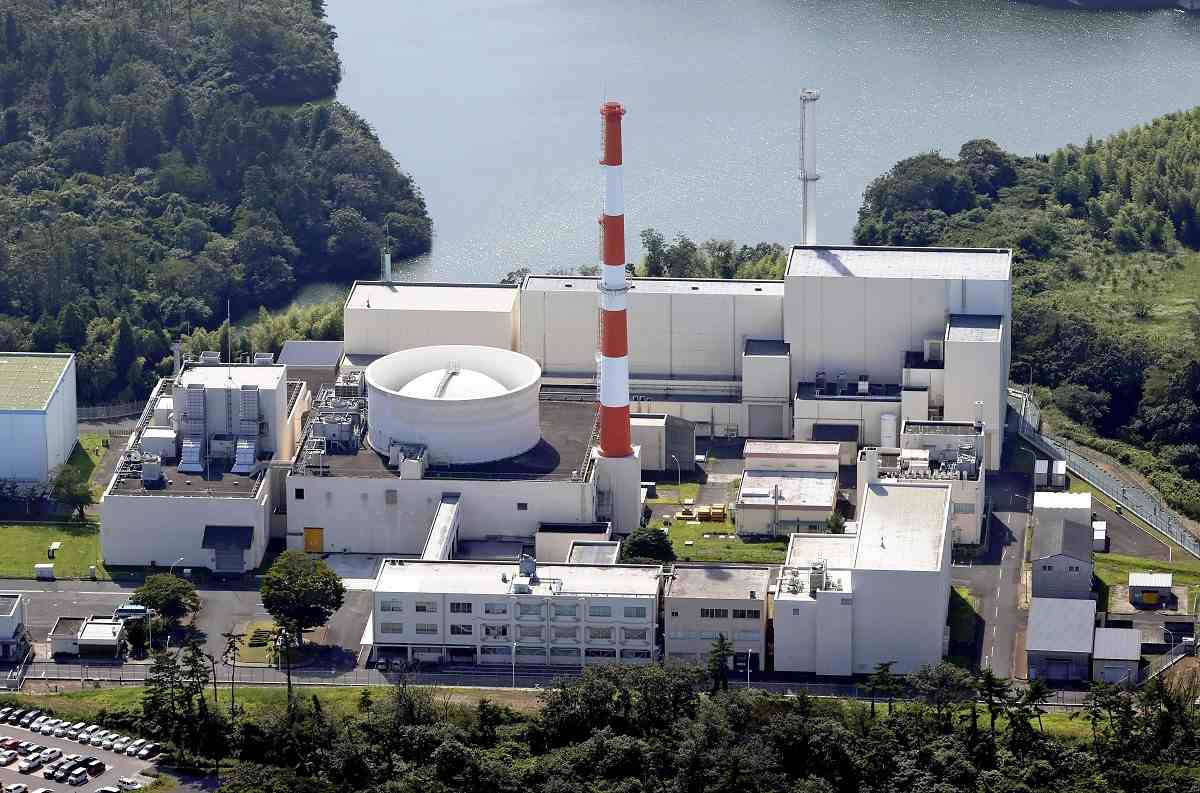Japan to Pursue Fuel Production for Fast Reactors; Seeks to Avoid Shortage, Protect Domestic Energy Security

The Joyo experimental fast reactor is seen in Oarai, Ibaraki Prefecture, on Thursday.
16:17 JST, July 4, 2024
The government intends to promote the domestic production of fuel for fast reactors, a type of next-generation nuclear reactor, as part of efforts to realize their commercialization, it has been learned.
Construction of a new plant will be considered to produce fuel for the Joyo experimental fast reactor in Oarai, Ibaraki Prefecture, which is run by the Japan Atomic Energy Agency (JAEA) but is currently not in operation. The aim is to establish a stable fuel supply system in preparation for the restart of the Joyo reactor in fiscal 2026, according to sources.
The government also wants to secure a domestic capability to manufacture such fuel for the sake of energy security.
Various countries have accelerated their efforts to develop next-generation reactors, including fast reactors, which generate carbon-free electricity. As a result, there are concerns about a possible shortage of fuel for such reactors in the future.
Currently, Russia is the only country that has sufficient manufacturing capacity for the fuel, but procuring Russian fuel has become difficult due to its aggression against Ukraine. The United States is now supporting domestic fuel manufacturers, to promote domestic production and break away from its dependence on Russia.
Similarly, Japan also intends to push domestic production of fuel for fast reactors.
Joyo is Japan’s only fast reactor. It has been out of operation since 2007 due to equipment trouble, but passed the Nuclear Regulation Authority’s safety screenings in 2023. Currently, preparations are underway to restart the reactor’s operations in mid-fiscal 2026.
About 680 fuel assemblies suitable for Joyo have been fabricated since 1972. However, fuel production was halted due to the prolonged suspension of the reactor.
According to sources, the existing fuel production equipment has aged, so it would be difficult for the facility to pass the safety screenings by the NRA under the current circumstances. Because fuel for Joyo has a high concentration of plutonium, it is said to be impossible for the private sector to produce the fuel.
Currently, about 80 unused fuel assemblies for the reactor are in storage, but the fuel could run out within 10 years after the restart of the reactor. The Education, Culture, Sports, Science and Technology Ministry, which has jurisdiction over the JAEA, therefore wants to build a new fuel plant within 10 years of the restart to prevent Joyo from shutting down due to a fuel shortage, according to the sources.
A new plant is expected to cost tens of billions of yen. The ministry plans to launch full-fledged discussions on its construction soon.
Fast reactors play a central role in the nuclear fuel cycle, in which plutonium contained in spent fuel is extracted and reused. The government aims to construct test reactors, which would be used to confirm economic viability, and commercial reactors based on the operation experience of Joyo.
Fast reactors use the properties of fast neutrons to use plutonium and other materials more efficiently than conventional reactors.
“We want to establish a system that will enable us to supply our own fuel without depending on other countries,” a senior official of the ministry said.
Top Articles in Politics
-

Japan PM Takaichi’s Cabinet Resigns en Masse
-

Sanae Takaichi Elected Prime Minister of Japan; Keeps All Cabinet Appointees from Previous Term
-

Japan’s Govt to Submit Road Map for Growth Strategy in March, PM Takaichi to Announce in Upcoming Policy Speech
-

LDP Wins Historic Landslide Victory
-

LDP Wins Landslide Victory, Secures Single-party Majority; Ruling Coalition with JIP Poised to Secure Over 300 seats (UPDATE 1)
JN ACCESS RANKING
-

Japan PM Takaichi’s Cabinet Resigns en Masse
-

Japan Institute to Use Domestic Commercial Optical Lattice Clock to Set Japan Standard Time
-

Israeli Ambassador to Japan Speaks about Japan’s Role in the Reconstruction of Gaza
-

Man Infected with Measles Reportedly Dined at Restaurant in Tokyo Station
-

Videos Plagiarized, Reposted with False Subtitles Claiming ‘Ryukyu Belongs to China’; Anti-China False Information Also Posted in Japan






















